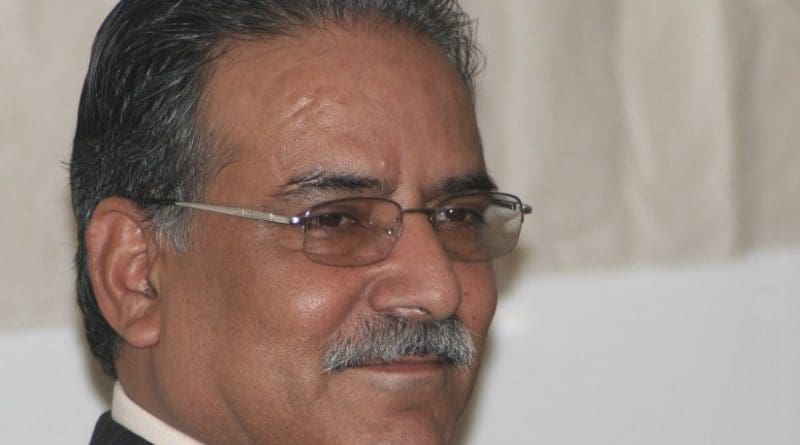Nepal’s PM Dahal Announces Local Body Elections: Madhesi Groups Unhappy – Analysis
By SAAG
By Dr. S.Chandrasekharan
On 21st February, after a marathon Cabinet Meeting, Prime Minister Dahal announced that the Local Body Elections will be held in May 14 in one go. The elections were last held in 1997.
The urgency to announce the elections soon despite the objections from the Madhesi Groups, was a Supreme Court Directive that said that elections to all the three tiers of the government should be held as mandated by the Constitution before January 21, 2018. There were suggestions particularly from the opposition UML to go for the provincial and federal elections and skip the local body elections altogether.
The UML is obviously in a hurry as they feel that the present time is ripe as they are still riding high on a nationalist agenda and for standing up to India after the “blockade.” While it is true that K.P. Oli and his followers are popular, it cannot be presumed right now that at the time of federal elections this popularity would turn into votes.
As expected, the Madhesi Groups are up in arms. They had maintained that the constitutional amendments should be gone through before the local body elections could be thought of. The problem is that the Constitutional amendment bill in the parliament is unlikely to get two thirds majority of the members unless the UML relents which it will not. K.P. Oli made a tongue in cheek comment that the local body elections can be gone through if the Madhesi Groups accept the result of the voting of the amendment bill in the parliament!
It is not that PM Dahal did not try to negotiate with the Madhesi groups. He had many meetings and the last one was on 19th February. But the Madhesi groups are adamant.
One of the top leaders of the Madhesi Group- Mrigendra Kumar Singh Yadav, declared that
To hold the local body elections despite the objection of the Madhesi Groups is to keep the Madhesis always under the thumb of the three major parties.
It is too premature to hold the elections when the issues relating to federalism and sharing of power between the centre and the provinces are yet to be settled.
It is not proper to conduct elections with an “unjustifiable” low number of local bodies in the Madhesi districts.
The SSFN and NSN ( Sanghiya Samajbadi Forum of Nepal and Naya Shakthi Nepal) of Upendra Yadav and Dr. Baburam Bhattarai while opposing the polls said that the LLRC report that had recommended 719 local bodies is “incomplete, unscientific and biased.” They also said that the local body elections come under the State’s jurisdiction under the constitution and therefore cannot be held before the provincial polls.
The LLRC had recommended 719 units for the local body elections and this has been done after a detailed study. The LLRC chairman Balananda Paudel who is busy closing the commission had said that the LLRC cannot make any changes in the report anymore. The task force that had examined the report had said that perhaps some additions could be made to the eight districts of Province No. 2. No number is being mentioned, but the intention appears to have another 25 units and it is within the jurisdiction of the government to increase the numbers suitably.
There is no doubt that time is running out and the local body elections will have to be gone through soon to pave the way for the provincial and federal elections. A tentative date in November is being thought of, for the provincial elections. But no one appears to be ready. The Constituency Delimitation Commission has not even been formed to fix the 165 constituencies at the federal level. Without federal constituencies, provincial level seats cannot be allocated.
It has been pointed out by many in the media that failure to hold elections to all the levels of the government within the mandated period will lead to a constitutional crisis. In a larger context this failure would threaten the very stability of the political structure and the future of the Constitution.
The Madhesi Groups should reconsider their inflexible position and realise that with present total opposition of the UML no amendment to the constitution is possible. They were the ones along with the Maoists who pushed for federalism. The Government has also activated the Federal Commission to ensure the rights of Madhesis, Tharus and indigenous communities. The Terai has suffered enough over the last two years due to regular agitations. It is time to think of alternatives to achieve their goals and let the local body elections be gone through with additional units recommended by the Task Force on the LLRC Report.
It is also true that the UML and its leader K.P.Oli have been very adamant and nasty to the Madhesis. If they continue with this kind of attitude towards the Madheis, I suspect many more C.K. Rauts seeking secession will emerge. It is time for them also to review their position.
An interesting suggestion has been made to amend Article 274 of Nepal’s Constitution in line with Article 3 of the Indian Constitution. Perhaps this can be examined.
It is time both for the Madhesi Groups and the UML who have considerable following in the Terai to move on rather than sticking to rigid positions.

